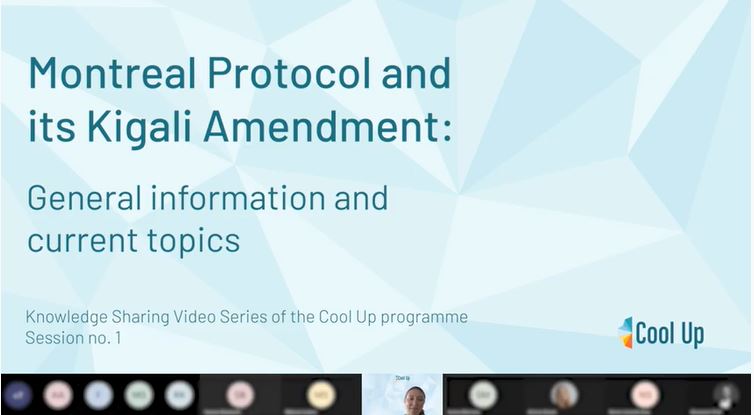News
Knowledge Sharing Session on Montreal Protocol and its Kigali Amendment
In Cool Up’s inaugural Knowledge Sharing Session, Öko-Recherche’s Barbara Gschrey presented on the Montreal Protocol and the Kigali Amendment. Barbara’s presentation covered several topics: the history and aims of the Montreal Protocol and the Kigali Amendment; institutional setup and bodies; and current discussions in the space. Watch the recording below.
In the session, Barbara Gschrey of Öko-Recherche explains that the Montreal Protocol was signed in 1987 and entered into force in 1989. The overall goal of the Protocol is to control production and consumption of ozone-depleting substances (ODS) in a stepwise manner. It is constantly evolving as new scientific, technical, and economic developments occur. As a result of the full implementation of the Montreal Protocol, the ozone layer is expected to recover by the middle of this century.
The Kigali Amendment is an amendment to the Montreal Protocol. It entered into force in 2019 and aims to phase down hydrofluorocarbons (HFCs) by cutting their production and consumption. The goal of the Amendment is to reduce HFC consumption and production by over 80% by 2047. It is important to note that Article 5 of the Kigali Amendment stipulates two different phase-down schedules, one for developed countries and another for developing countries.
UN Parties ratified the Montreal Protocol
GtCO2e estimated reduction thanks to the Montreal Protocol in 1990-2010
countries have ratified the Kigali Amendment as of 20 January 2022
There are several key institutional setups and bodies for the Montreal Protocol and Kigali Amendment. Barbara highlighted each of the following throughout her presentation: the Ozone Secretariat, the Meeting of the Parties (MOP), the Bureau of the Meeting of the Parties, the Open-Ended Working Group (OEWG), the Assessment Panels, the Implementation Committee, and the Financial Mechanism. Overall, the presentation gave a holistic view of these governing bodies, allowing the viewer to better understand how decisions are made in regard to the Montreal Protocol and Kigali Amendment.
The presentation ended by discussing current topics including energy efficiency and CFC-11 emissions.
To learn more about the Montreal Protocol and its Kigali Amendment, watch the full Knowledge Sharing session below.
For more information, you can also visit the OzonAction website here.

